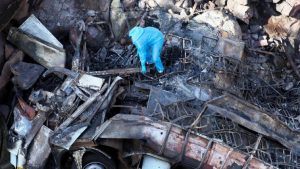Communications and Digital Technologies Minister, Khumbudzo Ntshavheni has officially switched off the last analogue transmitter in Limpopo. This makes Limpopo the fifth province to be switched off as the country migrates to digital broadcasting.
Ntshavheni is in the process of switching off all analogue transmitters in the country by end of March 2022, to ensure that South Africa migrates to digital broadcasting.
Four of the country’s nine provinces, the Free State, Northern Cape, North-West and Mpumalanga had already switched to digital.
Minister Ntshavheni says all South Africans deserve a pleasant TV watching experience with a clear picture quality, more free-to-air channels, and SABC radio stations of their choice, irrespective of where they are in the country.
“This is the last site that we are switching off in Limpopo in terms of analogue transmission. We had 34 TV transmitters for Limpopo, of those the last one we chose to switch off from is this one that transmits for Tzaneen, part of Mopani, and part of Vhembe. This is significant because we can then say on the 31st of March, when we release the spectrum and license the spectrum through Icasa that we are cleaning up the sub-one spectrum, the internet transmission of broad broadband transmission in the country, there will not be interferences. We have said, because we’re going to release the spectrum, we are giving these telecommunications mobile operators, obligations to connect all the 18,000 schools, public schools to have access to the internet so that our children are not affected by not having access to internet, not being able to learn, because now education is going digital. But we have also said we must connect all the clinics and all the hospitals.”
Ntshaveni says although the country took a long time to migrate to digital broadcasting, the government is committed to meeting the 31st of March deadline. She is also calling on all households with an income of R3 500 or less to register so that government can assist them to migrate.
“The analogue TV does not have the technology to receive digital television. So, we use the set-top boxes to then receive. You need to apply at the post office. You can go to the nearest post office or you can go online using your feature phone and the site is zero-rated. You can go to www.stpregistrations.gov.za and apply. But if you’ve bought a TV and not the ones you go and buy in the fake shops, they when you go and buy in proper shops, they do sell television from 2015. We’ve got a list on the department’s website, on the Sentech website, on the SABC website on SASSA website. I think if you know the CETA website, you go there and check the type of TV that is a digital television and to test whether your digital television is most of your flat screens the LED TVs are digital television.”
Meanwhile, Sentech CEO, Mlamli Booi, says the digital migration is long overdue and that they have been ready to migrate since 2008.
Booi says there are no subscription fees attached to the set-top boxes and digital television.
“Today, we came to Limpopo with the minister to do an analogue switch-off for television. Meaning that we are cutting off all the old broadcast systems that we had deployed many, many years ago, more than 40-years-ago. And we are modernizing it and we’ve turned it into digital. We will continue with the digital system, which we deployed at Sentech. From about 2008, until today, that network is live. So, if you want to access the network, first of all, those who have got the decoders, which we call set-up boxes (which) are sponsored by government, they will have the installation done for them at no fee to them. But there are those who do not qualify because of their earning capacity. It means, oh, they must find what we call a smart television set, which has got an internal tuner which you can use to just put an outside aerial or antenna, plug it into a television set, and then you tune it to the digital platform. In that digital platform or network, you will get more than 12 channels. You get all the SABC channels, sports, you get parliamentary, you are going to get more educational channels, which will be developed and broadcast by the SABC. So, it’s a high-capacity system, good quality, and good audio.”
Limpopo Economic Development MEC, Thabo Mokone, says the internet connectivity which will come with the digital migration, will help in growing the provincial economy.
“When we have connectivity, when we have internet it means that we’re on the road to creating more employment because people will have access to information. And this assists them to be able to do a lot of things. As we gather here, we are told that 70 SMEs benefited from this process, and each one of them was able to connect almost 200 people. It, therefore, means that it’s the beginning of things to come. Our understanding is that with this process, where people did not have access or connectivity, they will then have connectivity to where they did not have other radio stations, they will have those radio stations. Where they were not able to see sports, and they didn’t have a sports channel, now they have sports channels.”
Ntshavheni says she will visit the four remaining provinces, switching off all analogue transmitters, to ensure that South Africa is fully digitalised by the end of March.
Digital migration | Government clarifies the switch from analogue to digital: Minister Ntshavheni






